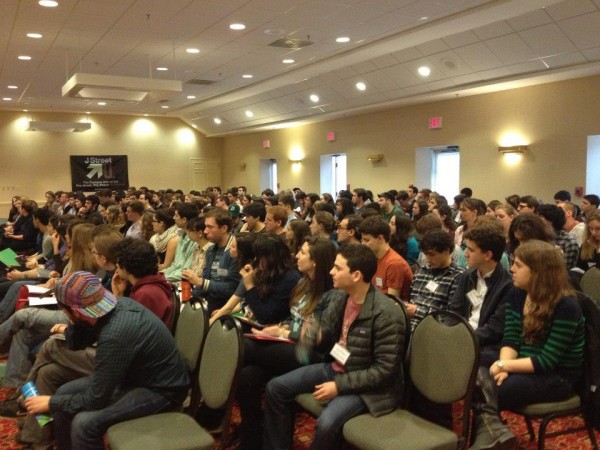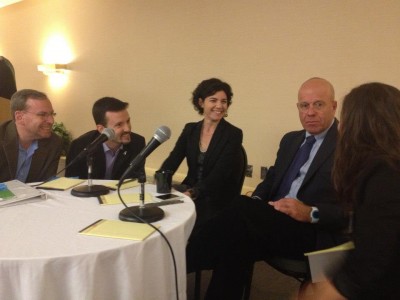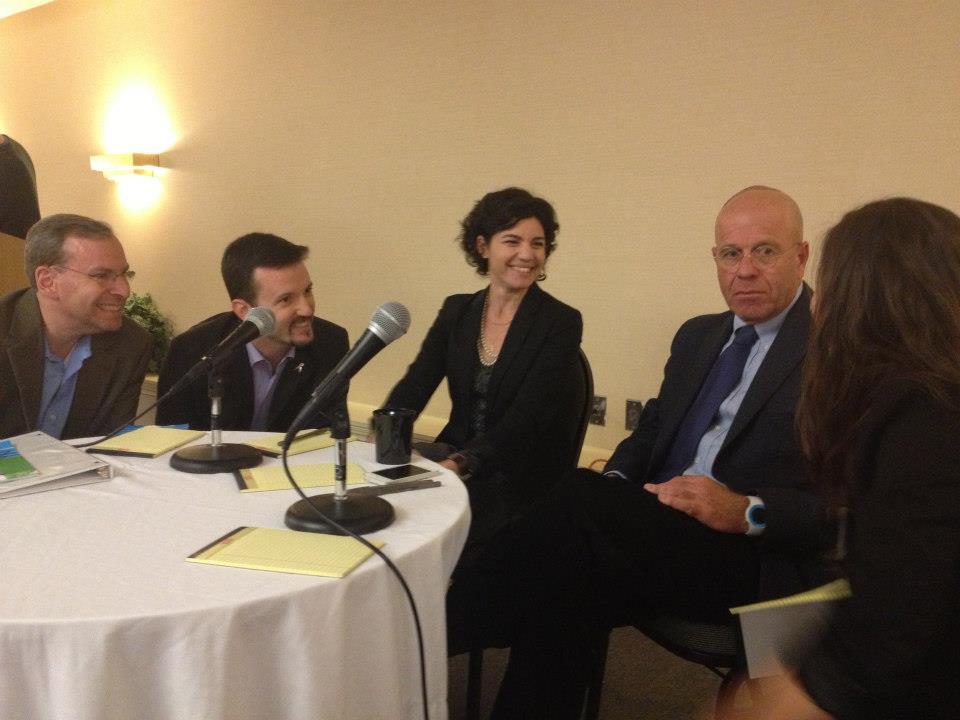
This year’s four-day J Street U Student Summit in Washington, D.C. was followed shortly by both the Passover holiday and President Obama’s quick trip to the Holy Land – yet the organization’s student leadership made a pointed effort to avoid the low-hanging fruit of the Passover metaphor. However, many an interlocutor capitalized on the intersection between Passover’s exodus from bondage and Palestinian freedom from the Occupation.
J Street U is the student-led college campus organizing arm of J Street, the pro-Israel group whose primary activity is lobbying American government officials to bring about a return to negotiations targeted at reaching a two-state solution to the Israeli-Palestinian conflict. Instead of dwelling on the obvious Passover metaphor, this student wing of the self-described “Political home for pro-Israel, pro-Peace Americans” focused on the apathy surrounding the Israeli-Palestinian peace process, and J Street’s efforts to lobby the Obama administration for a more meaningful Israel/Palestine trip.
In a series of panels, plenary sessions and workshops, conference participants explored the implications of the recent Israeli election, which demonstrated that many Israelis are turning inward toward economic issues and shifting their focus away from the Palestinian issue.
Recent polls show Palestinians hold similar levels of ambivalence toward a reconciliation that stalled under the administrations of Israeli Prime Minister Benjamin Netanyahu and Palestinian Authority President Mahmoud Abbas. That image contrasts with the reality of campus pro-Israel and pro-Palestinian activism, which just saw a cascade of Israel Apartheid Weeks and various counter-weeks (such as Israel Peace Weeks, etc.)
When it comes to a return to negotiations, “indifference” is a popular way to describe the impassionate and pessimistic view most of the important players hold to these days. Obama administration officials did their best to set low expectations for his visit, which concluded last week.
Nevertheless, Middlebury College junior Rachel Sider’s conference takeaway was an optimism tempered by current events. “Faced with the unrest in Syria, which threatens to spill into the Golan, the growing militancy of Hamas, and the continued uncertainty over Iran’s nuclear intentions, the Palestinians in many ways are Israel’s closest negotiating partner,” said Sider.
Still, the conference instilled hope in Sider about the prospect of advancing peace negotiations. “Several panelists spoke optimistically about the low expectations for Obama’s recent visit to Israel, Jordan and the West Bank,” Sider said. Their hope, she explained, is that merely discussing the peace process during Obama’s trip would give Israeli and Palestinian leaders the small push they need to get back to formal talks. This could be possible, Sider said, despite a shared “general feeling of apathy among” Israelis and Palestinians.
Similarly, the Summit’s speakers reflected a largely positive outlook regarding the prospect of peace. Of course, there was plenty of the backslapping and galvanizing integral to any activist organization’s conference. But after the perfunctory self-congratulation was over, Eli Valley – political cartoonist, satirist and general-purpose Jewish communal pot-stirrer – ascended to the stage for an interactive slide show examining and testing the limits of Jewish communal self-criticism.
The multimedia presentation, “Eli Valley’s Temple of Self-Hatred,” was equal parts autobiographical one-man show, stand-up routine, art exhibition and PowerPoint presentation. It blended Valley’s personal narrative with facets of Jewish life such as overwrought optimism about Birthright, overhyped anti-Semitism scares and knee-jerk assimilation paranoia into what the conference program called “an evening of neurotic superheroes, xenophobic Jedi, paranoid turtles, memories and mayhem.”
In a series of follow-up questions, Valley lauded J Street U as a presence that “breaks through the forces of the mind-numbing, lowest-common-denominator-propelling, independent-thought-squashing activism in Jewish life” and “an antidote to the defensive posturing – whether about anti-Semitism or intermarriage or what constitutes legitimate criticism of Israel – that encompasses so much of what passes for Jewish communal leadership.”
Valley considers J Street U to be at the vanguard of a brand of self-criticism that he worries is largely absent from the Jewish community. “J Street U asks people to question, and not in a smug or imbecilic sense but in a way that seeks to drive forward a commitment to social justice, activism and critical inquiry,” he said.
“When I hear how many students Hillel brings to AIPAC’s annual conference, I fall into a depression about the future of critical-minded American Jewish inquiry,” Valley said, referencing the comparisons often drawn between J Street and its older, more powerful, right-leaning counterpart, the American Israel Political Affairs Committee. But, he said, when he sees J Street U doing well, “the AIPAC depression slides away,” giving him hope for the future. “That’s no joke,” he added.
Another highlight of the conference was Tamar Zandberg, an Israeli legislator with the liberal Meretz party. Her unapologetic leftism and vocal criticism of Netanyahu’s new coalition partner, Yair Lapid, made her a favorite among attendees.
In a panel that also included author and academic Bernard Avishai, Zandberg lamented the dire straights of the Israeli left, while promising a new agenda that could include the a major Haredi (ultra-Orthodox) coalition party left out of the current coalition. “[United Torah Judaism] could be partners in a future coalition,” Zandberg said.
Referencing her work with Haredi politicians on the Tel Aviv City Council to ban “pornographic” advertisements, Zandberg did not discuss the role such an alliance would play in a resolution to the Israeli-Palestinian conflict. Zandberg is an important face of movement to end gender discrimination at the Western Wall, but her proposed partners are at the forefront of maintaining that status quo – which makes the prospect of an electoral alliance between Zandberg’s Meretz and the far-right, ultra-Orthodox UTJ an intriguing prospect.
Zandberg was also party to the conference’s tensest moment – and its greatest levity – when she put an end to a debate between two fellow panelists with a snappy retort.

Nizar Farsakh, director of the Palestinian Liberation Organization’s General Delegation to the US – the most visible of the several Palestinian speakers at the conference – opened the panel with a call for empathy and recognition of the “imbalance of privilege” between Jewish Americans and Palestinians when it comes to making a home in Israel/Palestine. This led former Knesset Speaker Avraham Burg to launch into a monologue slamming the Israeli left, which led, in turn, to a 15-minute debate between Burg and J Street President Jeremy Ben-Ami about political pragmatism.
Zandberg interrupted to gesture toward Farsakh before declaring that the time for minority voices – “a woman and a Palestinian,” meaning herself and Farsakh, respectively – had finally come. Burg, a German-born 58-year-old man, was stoic as the wilting crowd responded with cheers and Occupy-style “snapplause.”
Another telling moment from the Summit was a post-panel Q&A session that illustrated the philosophical and legal separation between the various organizations of the J Street family: JStreetPAC, a political action committee with the ability to endorse national-level political candidates; J Street Education Fund, which includes J Street U and J Street Local; and J Street, a 501 (c)(4) political lobbying organization – which J Street U members fondly refer to as “Big J Street.”
With the light on Ben-Ami, students pressed the J Street president to explain the distance between the students’ advocacy work and what one questioner characterized as a lack of energy in the national movement.
A better rejoinder than Ben-Ami’s response to that question was his response to Obama’s recent speech in Israel. The speech pressed Israelis to put themselves in the Palestinians’ place and “look at the world through their eyes.” It bemoaned the lack of fairness that a Palestinian child is forced to grow up in a state that isn’t her own, and in “the presence of a foreign army that controls the movements of her parents every single day.”
In his response, Ben-Ami wrote, “This speech encapsulated everything our organization believes and was founded to achieve.”
In his speech, Obama was unable to resist making the easy rhetorical connection between oppression and Passover, linking the Israeli, African-American, and Palestinian narratives together under an umbrella of exodus from bondage.
Simone Zimmerman, the student president of J Street U, finally brought the J Street U leadership on board with the tempting analogy in her post-Summit, pre-Passover email to all Student Summit attendees: “As Passover begins tonight – whether or not you celebrate – I hope the holiday’s message of freedom and liberty bring inspiration and energy to us all.”
Editor’s Note: J Street U partially defrayed the travel costs of the author, who attended the Student Summit as a participant.

